Defending Public Schools
MSEA members are protecting students, schools, and the profession
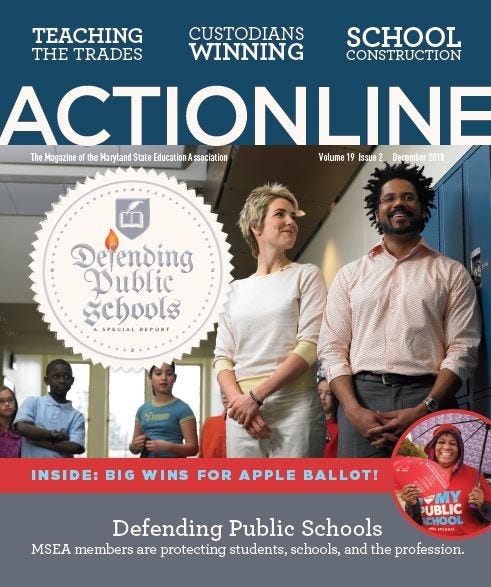
In the next few months, you’ll be hearing and reading a lot from MSEA and your local about the need to defend the teaching profession and raise our voices for strong schools. With the Kirwan Commission — that’s the Commission for Innovation and Excellence in Education — making its final recommendations for a wholly revamped education funding formula to the upcoming General Assembly, MSEA members will have lots to say.
That’s our tradition. We defend our professional status as skilled and trained educators. We defend every student’s right to a high quality and equitable education no matter their zip code, and we defend the rights of educators to having a voice at the table, whether at the State Board of Education or in conversations about how to improve your school.
Defending Standards
Sometimes defending high levels of professionalism requires getting into the weeds, building coalitions, and defeating bad ideas to lower standards before they can take root.
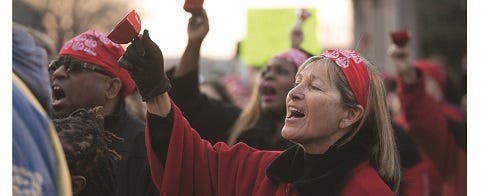
We were there this fall when members of the Maryland State Board of Education developed an ill-conceived regulation that would allow non- educators to become school superintendents, eliminating all need for a superintendent to have specific academic credentials — or even teaching experience. In that scenario, your superintendent could have had ZERO days of classroom experience yet make countless decisions that impact your daily work with students.
In September, the State Board voted in favor of the regulation, sending it to the Professional Standards and Teacher Education Board (PSTEB) for review before a final State Board vote to approve the regulation.
Want to be a school superintendent in Maryland? Successful business people, military generals and foundation leaders…www.baltimoresun.com
Educator Chris Lloyd, the chair of the Professional Standards and Teacher Education Board and president of the Montgomery County Education Association, railed against the proposition, telling the Baltimore Sun that it was the position of PSTEB that a person with no school-based experience couldn’t fully understand what takes place in a school building. “You are at a loss at setting good policy and good regulations,” Lloyd said. PSTEB voted unanimously against the regulation, even though the board has not rejected a State Board regulation in recent memory.
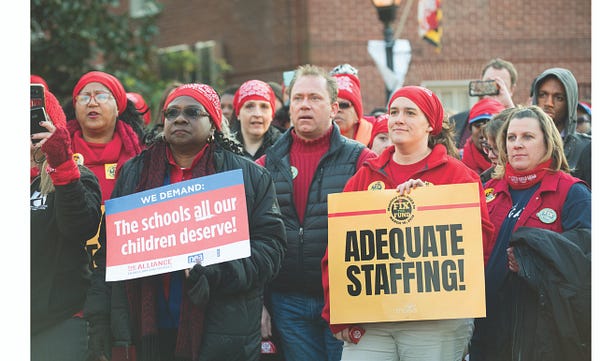
For the regulation to move forward, the State Board needed to override the PSTEB vote. MSEA and nearly 20 partner organizations on the Maryland Coalition of Equity — including superintendents, local school boards, the Maryland PTA, ACLU, Maryland NAACP, Greater Baltimore Urban League, Casa de Maryland, and more — kept the pressure up.
In a letter to the State Board, the coalition wrote, “It is critical that local superintendents be strong instructional leaders in order to provide educational guidance and make critical decisions that affect classroom instruction and procedures. We believe local superintendents must have teaching and administrative experience in the field of education. “The absence of this experience not only deprives superintendents of credibility with the workforces they must lead, but also means they lack an authentic, experience-based sense of how their decisions will impact classrooms.
“The consideration to reduce the criteria for those becoming superintendents is counterintuitive when at the same time the Kirwan Commission is considering recommendations to increase the certification requirement of teachers and administrators.”

In late October, the State Board reconvened — and failed to muster the super majority needed to push the regulation through. The voices of educators and public education supporters won the day, and served as a reminder of the importance of organizing, coalition-building, and defending high standards for our profession.
“Too often, we see decisions being made by people who don’t have experience working in our schools and don’t understand the negative impacts and impossibility of implementation that their choices may have,” said MSEA President Cheryl Bost. “When that happens, we can’t be silent.
That’s when it’s all the more important that we stand up and use our power on behalf of our profession.”
Students and Educators: More Than Test Scores
In early December, the state released brand-new report cards for Maryland public schools. The new system awards stars to every school in the state, with a maximum score of five stars. While the details of the system were developed by the State Board of Education, its mechanics were largely defined by the Protect Our Schools Act of 2017 — one of the shining achievements for MSEA members in recent years.
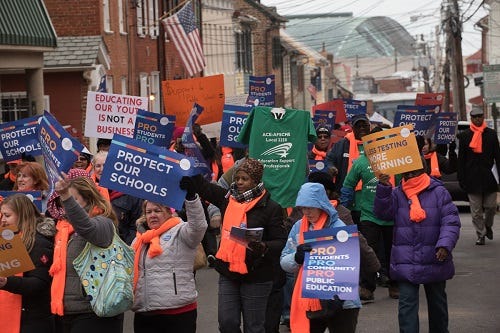
The Protect Our Schools Act (POSA)came after President Obama signed the Every Student Succeeds Act (ESSA) into law in 2015. ESSA was an effort to step back from what many saw as the federal overreach of No Child Left Behind with testing mandates interfering with instructional time and scores threatening to label, and punish, educators and schools. ESSA instead turned decision-making back to states and local school districts, but it also opened the door to the Betsy DeVos agenda of voucher-friendly schemes to raid Title I funds and send them to private schools and unaccountable charter schools.
MSEA members saw opportunity in ESSA to improve opportunity and outcomes for educators and students even as they organized to resist the privatization efforts of Secretary DeVos. We used that opportunity to pass the Protect Our Schools Act.
What the Protect Our Schools Act Did and Why It Matters Now
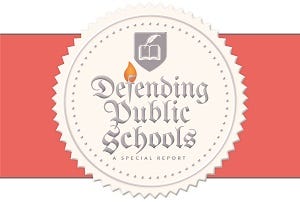
The Protect Our Schools Act (POSA) ensures that much more than standardized test scores are used to evaluate school success in state accountability systems like Maryland’s new five-star framework. Under federal law, state accountability plans must now incorporate both academic indicators — think test scores or graduation rates — and school quality indicators , such as a supportive school climate or access to teachers with advanced certification. Federal law requires states to give academic indicators more weight than school quality indicators, but it doesn’t say how much more.
Democratic lawmakers and representatives from the state teachers union, the state PTA and other organizations gathered…www.baltimoresun.com
POSA takes advantage of this long overdue opportunity to finally focus on more than just test scores, striking a balance of 65% academic indicators and 35% school quality indicators.
It requires the inclusion of educators and parents when developing school support and improvement plans. Under federal law, a certain number of schools will be identified as low-performing based on a state’s accountability system. By requiring school-level stakeholders to be involved in school turnaround decisions, it’s much more likely that school changes will revolve around the unique needs of a school and community rather than top-down, one-size-fits all solutions that too often don’t work.
It prevents the DeVos privatization agenda from gaining a foothold in Maryland. It stops the state from using federal Title I funding dedicated to high-poverty schools for private school vouchers, forcing public schools to be converted to charter schools, or taking over public schools and handing them over to private operators. In the past, we’ve seen the release of school accountability scores being used as an excuse to privatize the lowest-performing schools (which often have the highest concentrations of poverty and the widest gaps in opportunity for students). No more.
“It was so important that we passed the Protect Our Schools Act in 2017 and made sure that these accountability scores now depend on more than just standardized tests and can’t be used to privatize schools,” said MSEA President Cheryl Bost.
Maryland education officials released the first public school star rankings. All schools get a rating from 1 to 5 stars…www.wbaltv.com
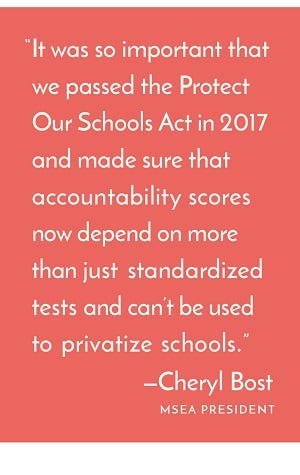
When the State Board announced the new star-based school ratings this month based upon those new ESSA/POSA indicators, Bost said, “Ultimately, school accountability only works if educators and parents drive change in their schools and have sustainable funding available to put in place new strategies — whether it’s hiring more counselors or adding a wellness center with medical services. At a time when each of our schools is already underfunded by an average of $2 million every year, we encourage everyone to not only dig into the report cards but also to strongly advocate for the changes and funding that your school needs to improve.
“We need to look at the data behind the ratings to see what it tells us about our schools and really let our educator, parent, and student stakeholders have a voice in improving their school,” Bost added. “And, we’ll need to fight hard during the 2019 legislative session to make sure that all of our schools have adequate, equitable, and sustainable funding to improve and then maintain their success.”
It’s Our Tradition
MSEA’s contributions to public education in Maryland are substantial and important. As a union, we’ve promoted the rights and opportunities of women, minorities, and LGBTQ+ communities, and we’ve fought for equality and equity for children no matter where they live. It’s our tradition.
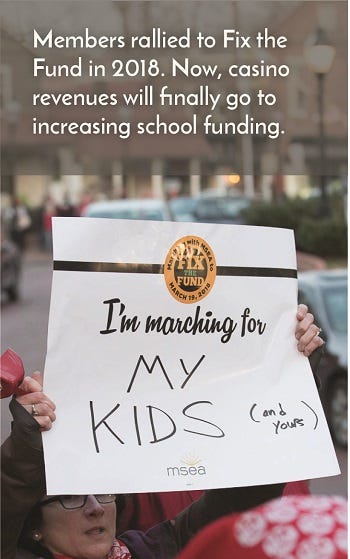
As we look at the recent successes of ESSA, POSA, and the pushback against the proposed loosening of the credentials required of superintendents, we know that our continued success relies on members’ voices, activism, and passion for defending and improving the profession they love.

